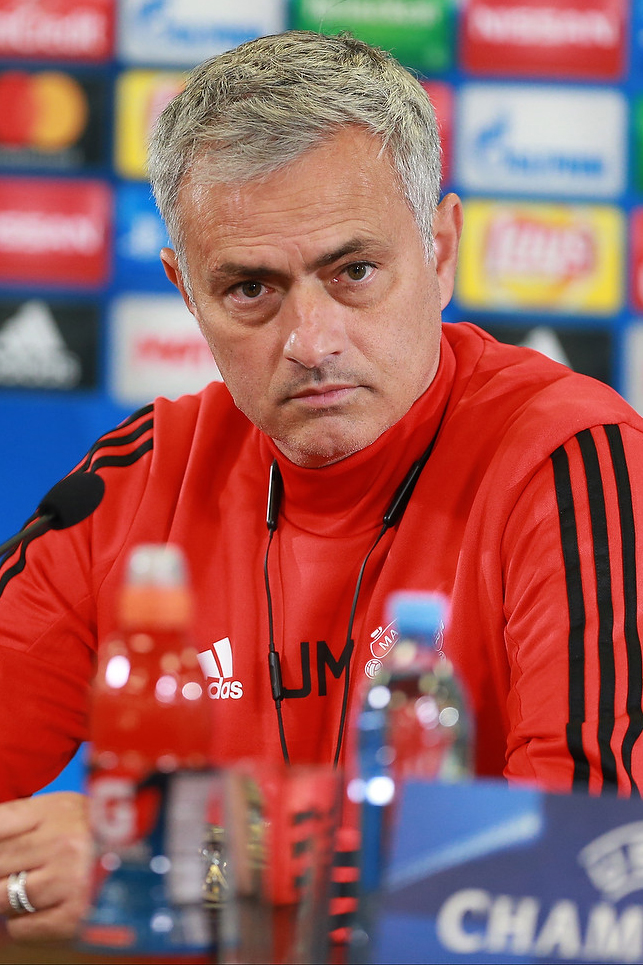In the aftermath of Jose Mourinho’s sacking from Manchester United, conversation turned toward certain players not showing their manager enough respect. But throughout Mourinho’s career, “respect” has always been a one-way street.

When the news broke last week that Jose Mourinho had finally— finally!— been sacked as the manager of Manchester United, people fell into one of two camps.
There was the schadenfreude camp, already teeing up the jokes and dusting off the tweets. This camp was teeming with the fans of rival clubs, everyone who was offended by the fact that they weren’t able to see Pogba, Shaw, Martial, and the likes play every week, and bystanders who really just hated everything Mourinho had ever said in his years of being one of the biggest villains in soccer. And there was the other side: the camp that had dug their heels in as Mourinho alienated his best players this season and managed the team into producing mediocre football on their good days. This camp had touted the word ‘disrespect’ for months, and were brandishing it again now that it was clear Mourinho was leaving Old Trafford.
They were, of course, talking about the players who had fallen out with Mourinho not treating his departure as a somber affair. The finger-pointing invariably ended up in the same place it was always going to: at midfield wonder, World Cup winner, and hairstyle-haver Paul Pogba.
The Pogba-Mourinho clash came down to a lot of things. Pogba and Mourinho have different footballing styles, for one. Mourinho favours a defensive style of play, while Pogba, in his own words, believes in ‘attack, attack, attack’. They also had very different ideas of what Pogba should have been focusing his non-football time and energy on. The already-fraught relationship just got worse when Pogba returned to the Premier League with his World Cup trophy, and Mourinho credited Pogba’s performance to the lack of distractions in Russia. And the tension kept building with both Pogba and Mourinho throwing verbal jabs at each other, Mourinho taking away Pogba’s vice-captaincy, and then finally keeping Pogba benched for game after game that United failed to have any impact in.
Pogba spending the season after winning a World Cup on the bench was already a mind-boggling turn of events, but doing so when his team needed the creativity of one of the best playmakers in the world seemed ridiculous. And so much of it comes down to the idea of ‘respect’, who deserves it, and who people demand if from.
If we listen to the that second camp, it’s Pogba who is at fault. It’s his Instagram posts that are disrespectful, his constantly changing hairstyle a point of contention, his inability to sit down and carry out his coach’s vision the reason for all of United’s woes. Pogba— the most expensive football player who continues to have hair— has spent most of his footballing career having his professionalism, maturity, and ‘respect for the sport’ questioned. Nevermind that he holds several trophies, the respect of his peers and teammates, and is one of the best players in the world. Have I mentioned that yet?
Respect for a sport is a nebulous concept and almost always demanded from young, successful, Black players. They enjoy themselves too much, their celebrations are too raucous, they go out too often and spend their money too extravagantly. Pogba in particular gets told that his constant visits to his barber are the reason his form occasionally dips. Black commentators have written about the double-standard applied to Black players— this piece from Tyler Tynes transcends any particular sport— and the constant barrage of racism that they have to deal with both on- and off-pitch. There is an incredible sense of entitlement in demanding Black players fundamentally change everything about themselves, then change all over again, in the name of ‘respect’, though that respect never seems to be extended to them.
And the thing is, I have also been using the word ‘disrespect’ for a while now. There was a distinct lack of respect in the way Mourinho spoke about and to his players, especially after losses. There was a lack of respect for the club and the fans in the way he was unwilling to start players who had slighted him in any way. And that’s just this season.
The incident that always comes to my mind when I think of the word ‘respect’ in connection with Mourinho, though, is what happened to Dr. Eva Carneiro in 2015. Dr. Carneiro rushed onto the pitch to treat an injury that Eden Hazard suffered in the first game of the season. Mourinho allegedly used abusive (and sexist) language when expressing his displeasure at her doing her job. She was forced out of her role at Chelsea, who had already done very little to make her work as one of the team doctors any less of a hostile environment.
When Manchester United hired Mourinho (while he was still in the midst of the Chelsea-Carneiro affair), they sent a message to the world as strong as the one Chelsea was sending when they asked Dr. Carneiro to step down. It’s the same message we read every week when the papers run another story vilifying Sterling, or when Gary Neville or Roy Keane point to Pogba’s barber as the worst problem in football.
There is a problem with respect in football. But it’s not the one we’re constantly hearing about.
Ritika Bhasker grew up loving football and talking about it with anyone who would listen. When she’s not yelling at a TV screen, she’s usually talking and writing about data and elections. Her proudest moment will always be the time The Guardian hailed her for remembering who Vladimír Šmicer is. You can find her on twitter @mostlyinane.

Contributors
Ritika Bhasker